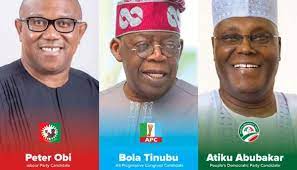
When shoe salesman Haruna Abubakar voted for President Muhammadu Buhari in 2015 and again in 2019, he was one of more than a million Nigerians backing the former army chief in his stronghold of northern Kano State.
Home to Nigeria’s second largest city and the economic heart of the country’s Muslim north, Kano was key to getting Buhari elected and re-elected four years later mainly on his twin promises of fighting jihadists and corruption.
According to AFP, after giving Buhari two chances, Abubakar said he has given up hope his ruling All Progressives Congress (APC) party can deliver and will cast his ballot elsewhere in Saturday’s presidential election.
Kano has long been a bastion for Buhari, an ethnic Fulani from nearby Katsina State. Now he is stepping down, the large bloc of voters who helped deliver his two election victories are up for grabs.
“We gave him a second chance so things would change for the better,” Abubakar said of his votes for Buhari. “But the opposite has happened — there is more insecurity, and people are in difficulties.”
More than 93 million Nigerians are registered to vote on February 25 with their country struggling with widespread insecurity from jihadists, criminal gangs and separatists, double-digit inflation, unemployment and growing poverty.
Saturday’s election has become an unprecedentedly competitive race among three frontrunners looking to succeed Buhari and Kano is one of the major battlegrounds.
The APC’s candidate, former Lagos governor Bola Tinubu, faces old rival and former vice president Atiku Abubakar of the main opposition Peoples Democratic Party (PDP).
But a surprise third candidate, Peter Obi of the Labour Party, has for the first time challenged the APC and PDP which between them governed Nigeria since the end of military rule in 1999.
– Scramble for votes –
To win the presidency, candidates must secure the most votes, but also win 25 percent in two thirds of Nigeria’s 36 states and federal capital district.
Nigeria is almost equally split between the mostly Muslim north and the predominantly Christian south, and voting is often along ethnic and religious lines. Turnout is traditionally higher in the north.
That makes key northern states must-wins for candidates. While Lagos has the most registered voters at more than 7 million, Kano has 5.9 million and northwest Kaduna State has 4.3 million — together making up 11 percent of all voters.
Southern Rivers State is next with 3.7 million.
“You can only win with three states, Kano, Lagos and Rivers,” Labour Party spokesman Yunusa Tanko told AFP.
But the three-way race makes the scramble for those votes even tougher in this election.
“Everybody is counting on Kano as a game-changer or decider as to what happens in politics, of who wins and who loses,” said Kano State College lecturer Kabiru Sufi.
“So those traditional votes, it’s like they’re being thrown in the open for anybody, hence the struggle.”
– ‘Fourth man’ –
The state is especially complicated this time because it is also the bastion of two-time former Kano governor Rabiu Kwankwaso, who is also a presidential candidate.
Formerly with the PDP, he broke with the party a year ago and later joined forces with the New Nigeria Peoples Party, a small alliance of PDP and APC renegades that has Kano as its stronghold.
Though most analysts do not expect him to win, his powerful influence in Kano and the north could complicate voting for the other three candidates in the state.
“Whatever Buhari did, Tinubu was part of it,” said Kano textile worker Abdulazeez Mohammed Jega. “No more APC. I am going for competence and that is Kwankwaso.”
Security and the economy top the list of voter concerns for Saturday, but a recent shortage of cash is also angering Nigerians just days before the vote.
Huge lines outside banks have erupted into violent protests in several cities, including in Kano earlier this month.
APC governors have warned Buhari over the economic fallout from the policy on the party’s fortunes in the election, fearing voters may punish it at the ballot box.
Buhari has urged patience and says the measure is aimed at curbing political corruption and inflation.
But for shoemaker Abubakar, the focus is on who comes next.
“I’ll vote, but I have not made up my mind yet,” he said. “I’m still weighing the candidates.”
Source: AFP




